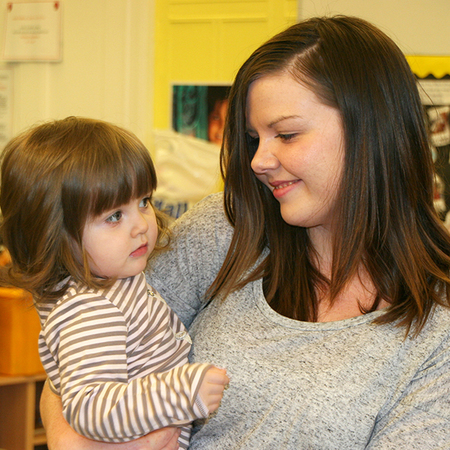
Download this article as a pdf
 Those who work in early years services are routinely demonstrated to be central to those services’ quality. However, despite international recognition of the importance of good quality early years education and care, there is little consistency in training requirements: all teachers of pre-primary education have a Bachelor’s degree in Finland, for example, while in the UK, Level 2 and Level 3 qualifications are all that is legally required to count in adult:child ratios.
Those who work in early years services are routinely demonstrated to be central to those services’ quality. However, despite international recognition of the importance of good quality early years education and care, there is little consistency in training requirements: all teachers of pre-primary education have a Bachelor’s degree in Finland, for example, while in the UK, Level 2 and Level 3 qualifications are all that is legally required to count in adult:child ratios.
Qualification levels are only part of the story, as staff are expected to have an extensive range of knowledge and other attributes to equip them for working with young children. I am interested in what staff are expected to know, how they come to know it and what they do with that knowledge.
I carried out some research on the subject, with reference to the European Key Competences for Lifelong Learning (LLL). This framework was produced by the European Commission in 2018 and focuses on not only knowledge, but also how knowledge interlinks with skills and attitudes.
I started by analysing existing literature on the early years workforce to find out what was advocated in terms of knowledge, skills and attitudes. In addition, I analysed the early years training requirements in seven European countries (France, Finland, Ireland, Italy, Hungary, Romania and the UK) both in regards to their structural features (such as qualification level and duration) and training content.
Later stages of the project tested out the knowledge, skills and attitudes identified with the early years workforce in Hungary and the UK, looking at students’ experiences of learning.
KNOWLEDGE
Early years is a multi-disciplinary field. With its roots in developmental psychology, it also has the additions of social cultural theories and sociology (Rhedding-Jones 2005). Other influences include curriculum studies, social policy, health studies, cultural studies and family studies. But the extent to which these disciplines are studied varies according to the country.
Some countries will favour particular disciplines over others, as a result of different perspectives (and even fashions) on which are most valid. In other instances the variations might be more nuanced to tradition and heritage. For example, in Hungary, students study psychology and the social sciences alongside traditional folk tales, music and art (Campbell-Barr 2017).
Beyond the disciplines that inform the early years, those working with young children will also need to know the children and their families. In addition, the type of setting or role held by an individual might include knowledge of leadership and management. Then there are the more localised and everyday forms of knowledge, such as the daily routine of an early years setting.
The below illustrates the types of knowledge that I identified in the literature. The list isn’t in any particular order and is not definitive, but an indication of just how much an individual is expected to know in order to work with young children:
? Child development knowledge (psychology, sociology, biology, etc).
? Knowledge of appropriate resources to use with children.
? Knowledge of children’s families.
? Knowledge of daily routines.
? Knowledge of how to construct the learning environment.
? Knowledge of how to interact with children.
? Knowledge of legislative requirements.
? Knowledge of the community that the children come from.
? Knowledge of the curriculum.

ATTITUDES
The use of the term ‘attitudes’ was also within my initial framework for analysing the literature, because working with children is about more than theoretical and everyday knowledge. While the literature did not always refer to the word ‘attitudes’ directly (‘dispositions’ and ‘values’ are often used), it commonly speaks of a need for the following, again in no particular order:
? Love.
? Respect for others.
? Wanting to make a difference.
? Being emotionally open.
? Empathy.
? Patience.
? Sensitivity.
? Confidence.
? Passion.
? Warmth.
? Commitment to the field of early years.
Often the items in the two lists are characterised as a distinction between hard and soft knowledge, but I think it is far more complicated than this. Knowledge comes in a variety of shapes and sizes. I think that attitudes can be regarded as a form of knowledge, but have the disadvantage of not being testable. Theories underpinned by positivist approaches – those of testing and experimenting – are often seen to have rigour, and because a theory has been rigorously tested, the theory stands up to scrutiny and is shared. Knowledge of how to be patient with a two-year-old (for example) is not gained in the same way, so there is no experimentation to reach a conclusion, and it can’t be documented and shared in the same way either.
Why is this important? Well, just because it is not testable doesn’t mean it hasn’t been learned as knowledge. Often in the literature, patience, empathy, sensitivity and warmth (for example) are seen as innate characteristics, something that individuals are born with, but I think it is important to emphasise that these are learnt.
Just as an individual might learn about developmental psychology, one also learns how to be patient, sensitive or empathetic. Attitudes are learnt through our interactions with others, such as knowing appropriate emotional responses to given situations. However, as with all knowledge, they evolve and change with time. Consider, for example, that when your patience has been tested during a busy day, this (admittedly often with hindsight) provides an opportunity to know how to manage your patience differently in the future.
As an example, students I spoke with in Hungary were aware that they needed to form relationships with the children they worked with while on placement. Considering this in the context of the knowledge needed to interact with children, one student commented that while some children came to her ‘naturally’ and they would play and she would be a part of their group, other children would not come to her or talk to her.
The student spoke about being loving and open towards the children and knew that she needed to form relationships with all the children, but despite her attempts to talk to and play with these children, she did not know how to develop her interactions with them.
SKILLS
Knowledge on its own is not enough. An individual needs to apply the knowledge to meet the demands of the context. For example, I can know about child development, but I cannot ‘do’ child development. The ability to ‘do’ something implies skill. However, I would not ‘do’ child development in isolation. Instead, those working with young children combine different types of knowledge to meet the needs of the context. As such, an individual will combine their theoretical knowledge on child development with their knowledge of the children they work with and in conjunction with their attitudinal knowledge when working in the early years.
In addition to knowing how to apply this combination of knowledge, a professional will also need to know how to evaluate it. The evaluation will include considering how well different knowledge is combined to meet the demands of daily practice, but also evaluating sources of knowledge. For example, individuals will look at where the knowledge has come from, its strengths and weaknesses and its usefulness in supporting professional practice. Everyday knowledge is often favoured by those working with young children as it feels less distant than theoretical knowledge, but if you consider knowledge in the plural – ‘knowledges’ – it illustrates that those working with young children require a range of different forms of knowledge.
Highlighting different types of knowledge is important for appreciating the complexities of coming to know how to work with young children, particularly at a time when there are challenges within the early years sector in relation to getting a commitment to, and funding for, well-qualified staff.
My research highlighted that many countries face challenges in regards to the pay and status of the early years workforce, alongside fluctuating policy initiatives to ‘up-skill’ the workforce and improve professional standards.
Not only do I recoil at the deficit view of the workforce as a problem to be fixed, but I struggle with the lack of an appreciation of the complexities of coming to know how to do this job.
An emphasis on ‘knowledges’ recognises the rich and varied ways that individuals know how to get the best from young children.
REFERENCES
• Campbell-Barr V (2017) ‘Interpretations of child centred practice in early childhood education and care’, Compare: A Journal of Comparative and International Education
• European Commission (2018) Proposal for a Council Recommendation on Lifelong Learning
• Rhedding-Jones J (2005). ‘Decentering Anglo-American curricular power in early childhood education: learning, culture, and “child development” in higher education coursework’, Journal of Curriculum Theorizing, 21 (3)
FURTHER INFORMATION
• The Research: Knowledge, Skills and Attitudinal Competences for Quality Early childhood Education and Care
• Funder: European Commission, under the Marie Curie European Research Fellowship









